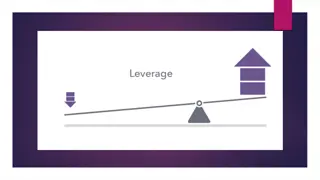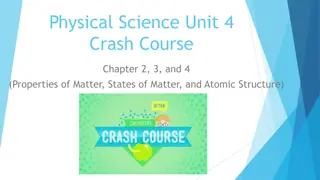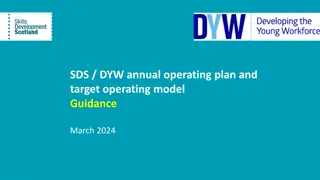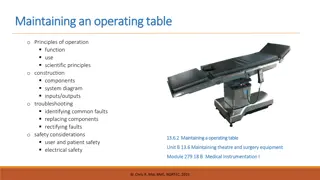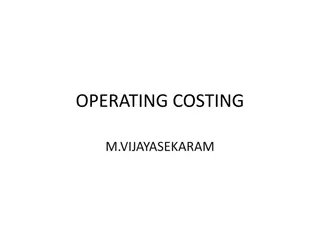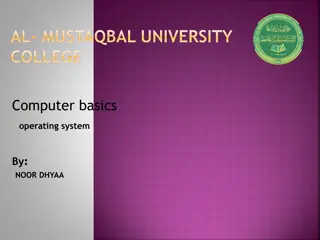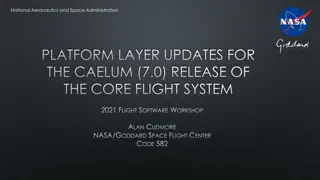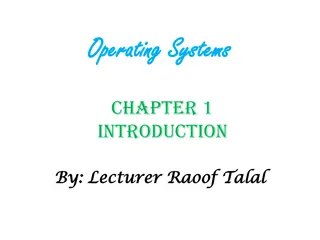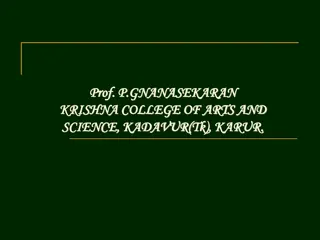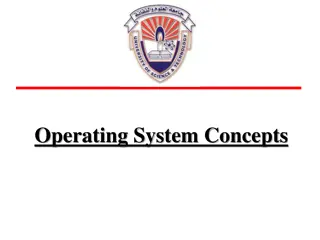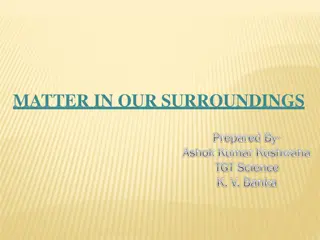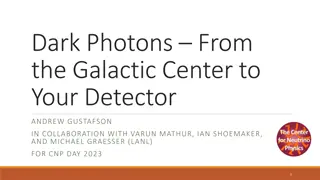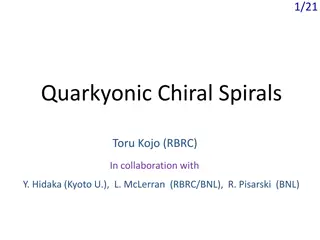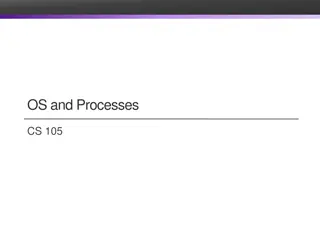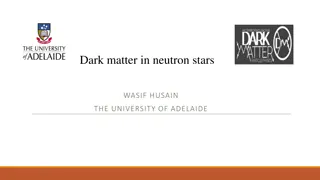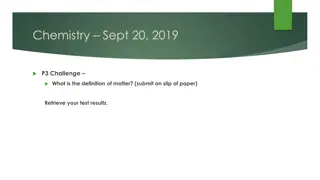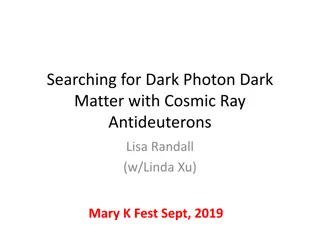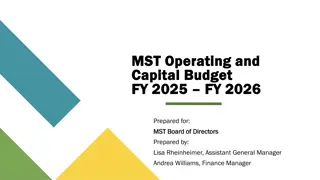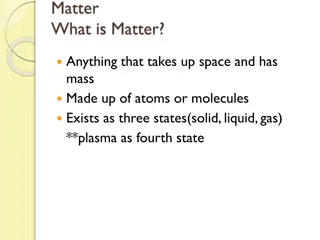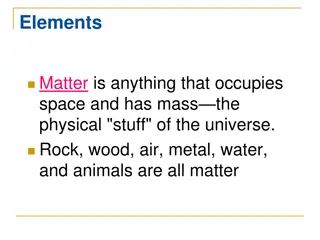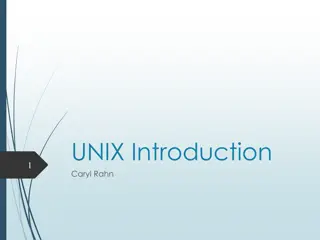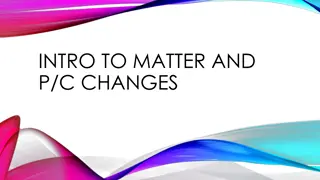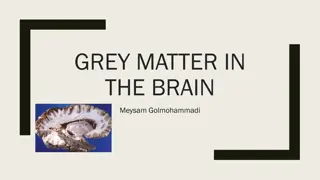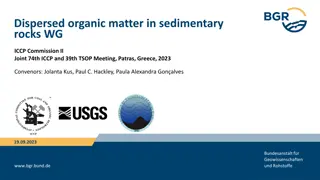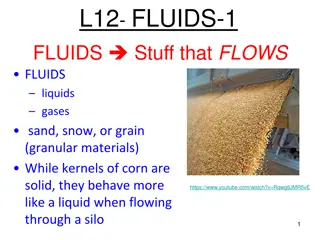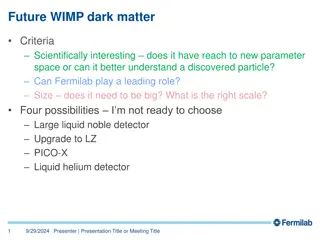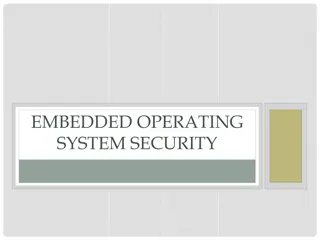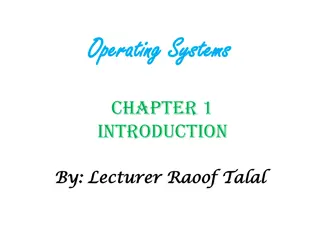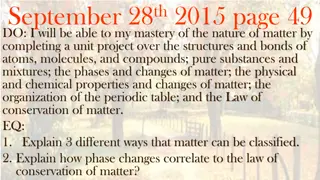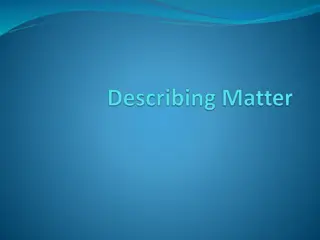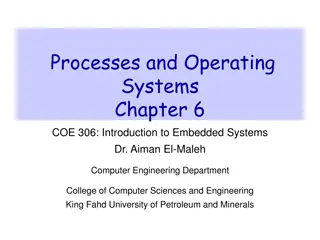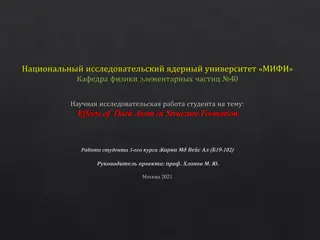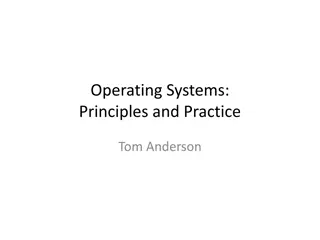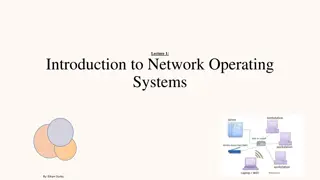Understanding Leverage and Operating Leverage in Financial Management
Leverage in financial management refers to using assets or funds with fixed costs to analyze the impact of debt and equity mix on shareholder returns and risk. Operating leverage focuses on leveraging fixed operating costs to amplify profit changes with sales variations, measured by the degree of op
2 views • 6 slides
Introduction to Chemistry: Matter, Energy, and Measurement
Chemistry is the study of matter, its properties, and the changes it undergoes. This content covers the basics of chemistry, including the classification of matter into pure substances and mixtures, different states of matter, and the building blocks of matter such as atoms and molecules. Sample exe
5 views • 51 slides
Operating Systems
An operating system is a crucial program that manages all other programs on a computer. It handles tasks like input recognition, file management, and device control. There are different types of operating systems such as single-user, single-task systems, multi-user, multi-task systems, real-time ope
6 views • 11 slides
Understanding Properties and States of Matter in Physical Science
Matter is made up of elements that cannot be broken down further. Different mixtures have distinct properties, such as solutions, colloids, and suspensions. Physical properties like viscosity and density can be observed without changing the material's composition. Chemical properties, like flammabil
2 views • 15 slides
SDS/DYW Annual Operating Plan and Target Operating Model Guidance - March 2024
This guidance outlines the development of an Annual Operating Plan and Target Operating Model (TOM) to enhance collaboration and improve outcomes for young people. It emphasizes aligning planning activities, co-designing learner experiences, and maximizing collective resources through strategic part
1 views • 9 slides
Maintaining an Operating Table: Principles and Functions
An operating table system comprises three components - the table column, table top, and transporter, each available in different versions for various surgical disciplines. Stationary tables are anchored to the floor, offering flexibility to adapt to patient needs. Mobile tables provide maneuverabili
0 views • 12 slides
Understanding Operating Costing in Service Industries
Operating costing is a method utilized by service-oriented businesses to ascertain the costs of providing services. Industries such as transportation services, welfare services, utility suppliers, and municipal services find operating costing beneficial. The method involves classifying costs into th
0 views • 6 slides
Understanding Operating Systems: Basics and Types
An operating system is essential software that manages a computer's hardware and software, allowing users to interact with the computer. Learn about the functions of an operating system, its importance, types available such as Microsoft Windows and macOS, and how they impact different devices. Disco
1 views • 11 slides
NASA Platform Layer Updates for the CAELUM (7.0) Release
The National Aeronautics and Space Administration (NASA) discusses platform layer updates for the CAELUM (7.0) release of the Core Flight System in the 2021 Flight Software Workshop. The platform layer consists of the Operating System Abstraction Layer (OSAL) and Platform Support Package (PSP), whic
1 views • 20 slides
Understanding Operating Systems: Introduction and Functions
An operating system plays a crucial role in managing computer hardware and facilitating user-computer interactions. It serves as an intermediary between users and hardware components, ensuring efficient resource allocation and control. The operating system coordinates the use of hardware resources b
5 views • 16 slides
Understanding Operating Systems: Functions and Evolution
Operating systems are essential software that enable computers to function effectively by managing hardware resources and facilitating communication between applications and hardware. This article covers the basics of operating systems, their structure, evolution, functions, and types. It also explo
2 views • 23 slides
Understanding Operating System Concepts: Lecture Overview and Services
Exploring the lecture content on operating system concepts, structures, services, system calls, and file manipulation. Delve into the importance of operating system services, error detection, program execution, I/O operations, protection, security, and resource allocation in operating systems. Learn
4 views • 26 slides
Understanding Matter in Our Surroundings
Matter in Our Surroundings discusses the classification of matter, physical nature of matter, and the properties of matter particles such as size, space between them, and continuous movement. It explains how matter is made up of particles and how they interact with each other through various activit
0 views • 27 slides
Unveiling Dark Matter Mysteries Through Dark Photons
Delve into the exploration of dark matter through the lens of dark photons in the galactic center and detectors. Uncover the enigmatic nature of dark matter, its interactions, existing constraints, and our model with fermionic dark matter and a dark photon mediator. Discover strategies to evade cons
0 views • 18 slides
Exploring Neutralino Dark Matter Mass Limits
Hajime Fukuda, along with researchers Shirai and Luo, conducted a study on the maximum mass of Neutralino dark matter particles. They investigated coannihilation effects and how colored sparticles can enhance LSP annihilation. The study delves into the implications for TeV-scale supersymmetry models
0 views • 39 slides
Exploring Quarkyonic Matter and Chiral Pairing Phenomena
Investigate the characteristics of quarkyonic matter and chiral pairing phenomena in the context of dense QCD at T=0. Delve into the confinement aspects, the properties of quarkyonic matter near T=0, and the candidates for chiral symmetry breaking. Consider the implications of chiral pairing phenome
0 views • 42 slides
Introduction to Operating Systems and Processes
In this informative content, we delve into the fundamental concepts of operating systems (OS) and processes. Operating systems are essential software that manage a computer's resources for users and applications. We explore the core functionalities of an OS, such as resource allocation, isolation, c
0 views • 41 slides
Exploring Dark Matter in Neutron Stars
Investigate the interaction of dark matter within neutron stars, comprising approximately 25% of the universe's total matter. The nature of dark matter assumptions, its distribution within neutron stars based on fermionic or bosonic properties, and the implications for self-interacting fermionic and
0 views • 22 slides
Understanding Matter and its Classification in Chemistry
Matter is defined as anything that occupies space and has mass. It can be classified into solids, liquids, and gases, as well as pure substances and mixtures based on their composition. This overview covers the states of matter, Aristotle's four elements theory, and the classification of matter into
0 views • 13 slides
Searching for Dark Photon Dark Matter with Cosmic Ray Antideuterons
Exploring the use of cosmic ray antideuterons for dark matter detection is a promising avenue in astrophysics. Antideuteron searches offer a low-background environment, making them ideal for detecting certain types of dark matter particles. Unlike antiproton searches, which face significant backgrou
0 views • 30 slides
MST Operating and Capital Budget FY 2025 Summary
The MST Operating and Capital Budget for FY 2025 focuses on maximizing revenues, increasing bus advertising rates, promoting transit services, seeking grants for capital projects, and maintaining stable staffing levels. The budget priorities also include operating a Better Bus Network at Board-adopt
0 views • 10 slides
Understanding States of Matter and Kinetic Theory
Matter is anything that occupies space and has mass, existing in solid, liquid, gas, and plasma states. The states of matter depend on the arrangement and motion of atoms. Solids have fixed shapes, liquids take the shape of their container, and gases fill the volume of their container. The Kinetic T
0 views • 18 slides
Exploring the World of Matter and Elements
Matter is the physical "stuff" of the universe, encompassing elements that make up rocks, wood, air, metals, water, and living organisms. Chemical elements are the building blocks of matter, with essential elements like oxygen, carbon, hydrogen, and nitrogen constituting a significant part of living
0 views • 24 slides
Understanding UNIX Operating System
UNIX is a versatile operating system that enables multi-user access, multitasking, and portability across various computing environments. It serves as the foundation for many modern operating systems and has influenced concepts incorporated in Microsoft Windows and DOS. The UNIX system comprises dis
0 views • 51 slides
Exploring Matter and Physical/Chemical Changes in Science Class
Delve into the world of matter and its transformations through engaging activities such as classifying elements, compounds, and mixtures using nuts, bolts, and washers. Understand the concepts of mass, space, and the different types of matter through hands-on learning experiences in this interactive
0 views • 31 slides
Understanding Gray Matter in the Brain: Structure, Function, and Importance
Gray matter in the brain plays a crucial role in information processing and cognitive functions. Composed of neuronal cell bodies and unmyelinated axons, gray matter is visibly pinkish-gray and is essential for various brain functions. It forms a synaptically dense area with fewer cell bodies compar
0 views • 7 slides
Dispersed Organic Matter in Sedimentary Rocks - Review Paper for Geological Application Studies in the 21st Century
The WG on Dispersed Organic Matter in Sedimentary Rocks is working on a review paper focusing on application studies of dispersed organic matter (DOM) within a geological context. The paper aims to provide an insightful overview titled "Applications of Dispersed Organic Matter Petrology in the 21st
0 views • 18 slides
Introduction to Linux: Course Overview and Objectives
This introduction to Linux course provides a comprehensive overview of operating systems, including the history, variations, user interface, and essential commands. The course is designed with lectures, labs, and exercises to help participants gain a better understanding of Linux and its practical a
0 views • 77 slides
Understanding Matter: Solids, Liquids, Gases, and Fluids
Matter exists in various states - solid, liquid, gas, and fluid. Solids have atoms closely packed, liquids have more freedom but still cohesion, gases have atoms spread out, and fluids flow like liquids or gases. Mass density characterizes matter based on atom proximity. Gas pressure results from mo
0 views • 22 slides
Future Prospects in Dark Matter Research at Fermilab
Exploring new avenues in the realm of dark matter research, Fermilab stands at the forefront with potential upgrades to their detectors, such as the LZ and PICO-X. The presentation delves into the scientific criteria influencing the choice of detectors, the pursuit of understanding dark matter and d
0 views • 6 slides
Understanding Embedded Operating System Security
Embedded operating systems are designed for special purposes with limited resources and small sizes, found in various devices like ATMs, smartphones, cars, and more. Common operating systems include VxWorks, Windows, QNX, and SCADA, with different applications and requirements. Windows CE stands out
0 views • 21 slides
Understanding Operating Systems: An Introduction and Overview
An operating system is a crucial program that manages computer hardware and serves as an intermediary between users and hardware. This chapter explores the role of operating systems in a computer system, covering components like hardware, application programs, and users. It delves into how operating
0 views • 16 slides
Understanding Matter: States, Properties, and Changes
Matter is anything with mass and volume, existing in solid, liquid, or gas states. The Kinetic Molecular Theory explains the behavior of particles in matter. Chemistry explores matter through chemical and physical changes. Different factors, like temperature, can change the state of matter. Physical
0 views • 6 slides
Exploring the Nature of Matter: Unit Project Overview
Embark on a journey to understand the structures and bonds of matter through a comprehensive unit project. Delve into atoms, molecules, compounds, pure substances, mixtures, phases of matter, properties, periodic table, and conservation laws. Explore matter classification and phase changes' relation
0 views • 9 slides
Introduction to Chemistry and Matter
Understanding chemistry involves studying the properties of matter and its changes. Matter is anything that occupies space and has mass, composed of vibrating atoms. It includes examples like air, water, books, desks, and people, while non-examples are light, sound, thoughts, and emotions. Physical
0 views • 18 slides
Introduction to Processes and Operating Systems in Embedded Systems
Processes and operating systems play a crucial role in building complex applications on microprocessors, offering flexibility to meet timing requirements. The operating system (OS) manages processes by providing mechanisms for switching execution between them. Real-Time Operating Systems (RTOS) are
0 views • 65 slides
Exploring Dark Atom Effects on Structure Formation in the Universe
Overwhelming evidence points towards the existence of dark matter in the universe, with various theoretical models such as OHe atoms and Glashow's EIMP model proposed to explain its nature. Dark OHe atoms, consisting of 2 charged particles bound with primordial He nuclei, offer a unique perspective
1 views • 8 slides
Understanding Operating Systems: Principles and Practice in CSE Curriculum
Dive into the world of operating systems through the lens of "Operating Systems: Principles and Practice" by Tom Anderson. Discover how this course fits in the UW CSE curriculum, covering systems programming, operating system interfaces, and distributed systems. Explore the project work on building
0 views • 21 slides
An Overview of Network Operating Systems and Multitasking
This informative content discusses the services of network operating systems, multitasking concepts, essential components, client and server software elements, and network services. It explains the two forms of multitasking - preemptive and nonpreemptive - and their functions within operating system
0 views • 48 slides
Overview of Network Operating Systems and Their Features
Network operating systems are essential software that manage computer resources and provide services for programs. This lecture covers the types of computers in a network, features of operating systems such as process and memory management, disk and file systems, and networking capabilities. Underst
0 views • 27 slides
